
3 Approvals and Certications
This section provides a brief description of the various
approvals and certications that are found on Danfoss
drives. Not all approvals are found on all drives.
3.1 Regulatory/Compliance Approvals
NOTICE
IMPOSED LIMITATIONS ON THE OUTPUT
FREQUENCY
From software version 6.72 onwards, the output
frequency of the drive is limited to 590 Hz due to export
control regulations. Software versions 6.xx also limit the
maximum output frequency to 590 Hz, but these
versions cannot be ashed, that is, neither downgraded
nor upgraded.
3.1.1.1 CE Mark
The CE mark (Communauté Européenne) indicates that the
product manufacturer conforms to all applicable EU
directives. The EU directives applicable to the design and
manufacture of drives are listed in Table 3.1.
NOTICE
The CE mark does not regulate the quality of the
product. Technical specications cannot be deduced from
the CE mark.
EU Directive Version
Low Voltage Directive 2014/35/EU
EMC Directive 2014/30/EU
Machinery Directive
1)
2014/32/EU
ErP Directive 2009/125/EC
ATEX Directive 2014/34/EU
RoHS Directive 2002/95/EC
Table 3.1 EU Directives Applicable to Drives
1) Machinery Directive conformance is only required for drives with
an integrated safety function.
NOTICE
Drives with an integrated safety function, such as Safe
Torque O (STO), must comply with the Machinery
Directive.
Declarations of conformity are available on request.
Low Voltage Directive
Drives must be CE-labeled in accordance with the Low
Voltage Directive of January 1, 2014. The Low Voltage
Directive applies to all electrical equipment in the 50–
1000 V AC and the 75–1500 V DC voltage ranges.
The aim of the directive is to ensure personal safety and
avoid property damage when operating electrical
equipment that is installed, maintained, and used as
intended.
EMC Directive
The purpose of the EMC (electromagnetic compatibility)
Directive is to reduce electromagnetic interference and
enhance immunity of electrical equipment and instal-
lations. The basic protection requirement of the EMC
Directive is that devices that generate electromagnetic
interference (EMI), or whose operation can be aected by
EMI, must be designed to limit the generation of electro-
magnetic interference. The devices must have a suitable
degree of immunity to EMI when properly installed,
maintained, and used as intended.
Electrical equipment devices used alone or as part of a
system must bear the CE mark. Systems do not require the
CE mark, but must comply with the basic protection
requirements of the EMC Directive.
Machinery Directive
The aim of the Machinery Directive is to ensure personal
safety and avoid property damage to mechanical
equipment used in its intended application. The Machinery
Directive applies to a machine consisting of an aggregate
of interconnected components or devices of which at least
1 is capable of mechanical movement.
Drives with an integrated safety function must comply with
the Machinery Directive. Drives without a safety function
do not fall under the Machinery Directive. If a drive is
integrated into a machinery system, Danfoss can provide
information on safety aspects relating to the drive.
When drives are used in machines with at least 1 moving
part, the machine manufacturer must provide a declaration
stating compliance with all relevant statutes and safety
measures.
3.1.1.2 ErP Directive
The ErP Directive is the European Ecodesign Directive for
energy-related products, including drives. The aim of the
directive is to increase energy eciency and the level of
protection of the environment, while increasing the
security of the energy supply. Environmental impact of
energy-related products includes energy consumption
throughout the entire product life cycle.
3.1.1.3 UL Listing
The Underwriters Laboratory (UL) mark certies the safety
of products and their environmental claims based on
standardized testing. Drives of voltage T7 (525–690 V) are
Approvals and Certication... Design Guide
MG38C202 Danfoss A/S © 01/2018 All rights reserved. 7
3 3






















